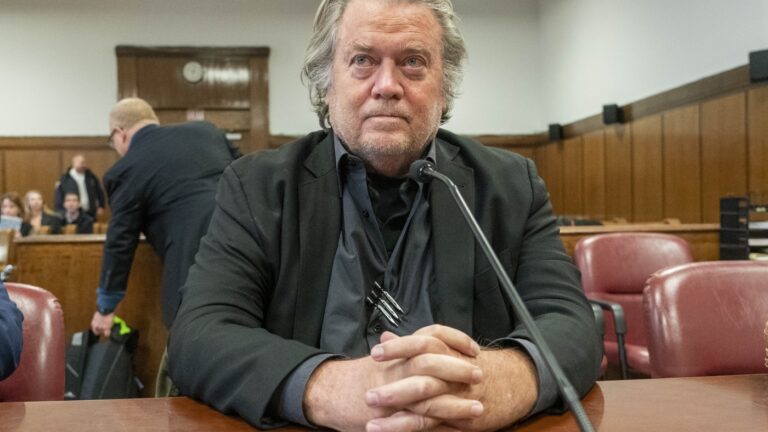
Steve Bannon appeared in court in New York on January 12, 2023. Bannon says he plans to challenge a judge’s ruling on Thursday that he must report to prison by July 1 to begin serving a four-month sentence for failing to comply with a subpoena from a House committee investigating the attack on the U.S. Capitol.
Stephen Hirsch/New York Post via The Associated Press
Hide Caption
Toggle caption
Stephen Hirsch/New York Post via The Associated Press
WASHINGTON — Steve Bannon, a longtime ally of former President Donald Trump, must report to prison by July 1 to begin serving a four-month sentence for failing to comply with a subpoena from a House committee investigating the U.S. Capitol attack, a federal judge ruled Thursday.
U.S. District Judge Carl Nichols in Washington granted the Justice Department’s request to allow Bannon to begin serving his sentence after a federal appeals court upheld his contempt of Congress conviction last month.
Bannon is expected to seek a stay of the judge’s order, which could delay his extradition date.
“I have good lawyers and I will go all the way to the Supreme Court if necessary,” Bannon told reporters outside the courthouse, adding that “you can’t build a prison or a jail to silence me.”
In a social media post on Thursday, Trump accused prosecutors of being “desperate” to put Bannon behind bars. He repeated his claim that Republicans are being persecuted by a politically motivated justice system. This rhetoric has escalated since the presumptive GOP presidential nominee was convicted of 34 felony counts in a hush money trial in New York last week.

Judge Nichols, who sentenced Bannon to prison, was appointed to the bench by President Trump in 2018.
Bannon was convicted nearly two years ago on two counts of contempt of Congress: one for refusing to testify before a House committee on Jan. 6 and another for refusing to provide documents related to Trump’s involvement in efforts to overturn the 2020 presidential election, which he lost to Democrat Joe Biden.
Judge Nichols initially believed the case raised serious legal questions and had allowed Bannon to remain free while he fought his conviction, but during a hearing in federal court in Washington, Judge Nichols said the calculations had changed after an appeals panel found all of Bannon’s challenges to be without merit.
“I don’t think the original rationale for me to stay exists anymore,” Nichols said.
Bannon can appeal his conviction to the D.C. Circuit Court of Appeals and the U.S. Supreme Court. Prosecutor John Crabb told the judge it was “highly unlikely” that Bannon would be able to have his conviction overturned.
At trial, Bannon’s lawyers argued that his former adviser had not ignored the subpoena and was negotiating in good faith with congressional committees at the time he was indicted.
The defense says Mr. Bannon was acting on the advice of his then-lawyer, who told him the subpoena was invalid because the committee had not allowed Mr. Trump’s lawyers to be present and that he couldn’t determine what documents or testimony he could produce because Mr. Trump had asserted executive privilege.
His lawyer, David Schoen, told the judge that it would be unfair to send Bannon to prison now because he will have served out his sentence before completing his appeals. Schoen said the case raises “serious constitutional questions” that need to be heard by the Supreme Court.
“In this country, we don’t send people to prison because we believe they’ve done something that violates the law,” he told reporters.
Trump’s second-highest-ranking aide, trade adviser Peter Navarro, was also found guilty of contempt of Congress and entered prison in March to serve a four-month sentence.
Navarro also argued that he could not cooperate with the committee because Trump had invoked executive privilege, but the court rejected that argument, finding that Navarro had failed to prove that Trump had in fact invoked executive privilege.
The House committee’s final report on Jan. 6 concluded an extraordinary 18-month investigation into the former president and the violent riot, alleging that Trump criminally engaged in a “multifaceted conspiracy” to overturn the legitimate results of the 2020 election and failed to act to stop his supporters from storming the Capitol.
Bannon also faces criminal charges in New York state court for allegedly defrauding donors who funded a wall along the southern border of the U.S. Bannon has pleaded not guilty to charges including money laundering, conspiracy and fraud, and the trial has been postponed until at least the end of September.

